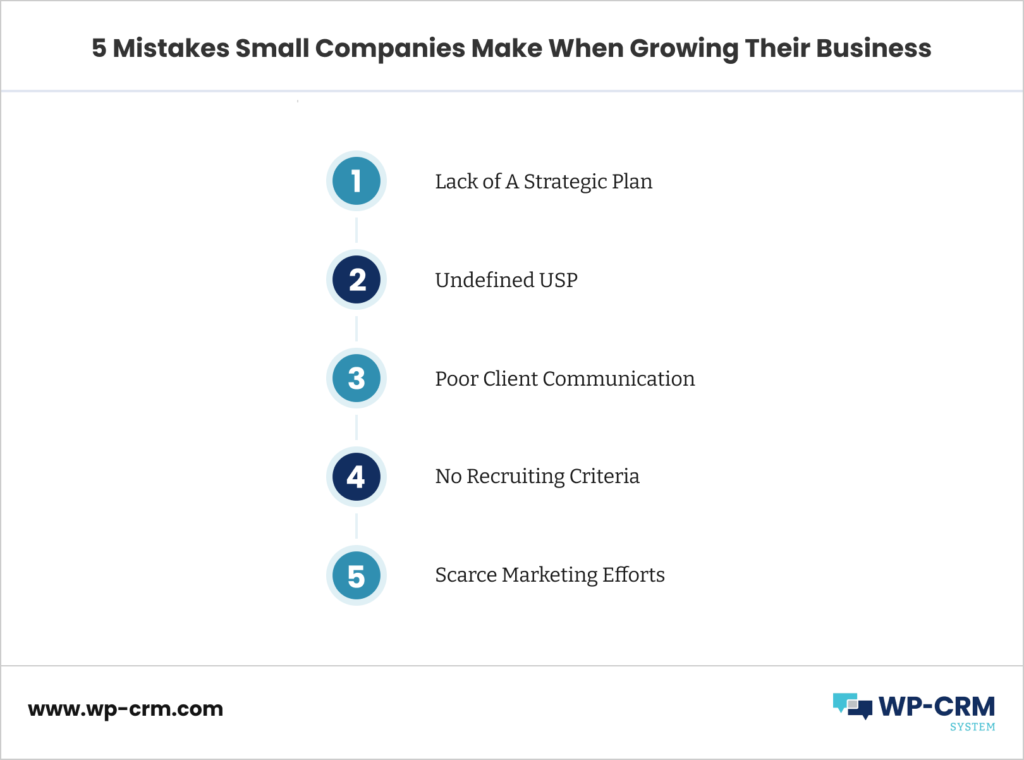5 Mistakes Small Companies Make When Growing Their Business
If you’re a small company, growing your business can be tricky. There are so many things to consider – from scaling up your operations to expanding your reach and targeting new customers. However, a small business mistake can affect your company quite a bit if not handled on time.
Did you know that over 90% of companies globally represent small or medium-sized businesses? They are the driving force of the economy and yet, half of them fail within the first five years.
Although the statistics are a bit daunting, owning a small business is a privilege. You get to develop an idea you care about and grow it to success. However, in 2022, when the economic landscape is vague and unsettled, you need to always be on your guard and manage risks in a timely manner.
Therefore, you need to constantly analyze your business, its current standing, and where it could go in the future. The road ahead won’t be easy but by avoiding these 5 little-known small business mistakes you can reduce the risks and increase the chances of success.

You Lack A Strategic Plan
Many businesses make the mistake of not having a clear plan at the very beginning. You need to ask yourself what your long-term goals are for the company. What do you hope to achieve in 2 years? 5 years? Even small business mistakes can slow down your progress. What is your desired worth for the business? We often hear people talk about lifestyle businesses, but few explain how to achieve one.
So, in order to grow your business and make it profitable, you need to have a strategic plan in place. Also, know where your business stands in the current state of your industry, where it can go in the future, and what steps to take to get there. A strategic plan is vital to any founder as it details how to reach your business goals, and keeps you accountable.

You Haven’t Determined Your USP
Your unique selling point, or USP, is what sets your business apart from the rest. It refers to all the features and characteristics that make your customers choose you over the competition. If defined correctly, your USP can really boost your profitability and help you close more deals.
Failing to formulate a distinct USP can have a number of negative effects on your small business. Firstly, it can make it difficult for potential customers to understand what it is that makes your business unique and why they should choose to do business with you over your competitors. This can lead to a loss of sales and customers, as well as reduced brand awareness and recognition.
Additionally, the lack of a clear USP can make it difficult for your employees to understand your business’s mission and purpose, which can lead to a loss of motivation and productivity. Finally, not having a strong USP can make it difficult to attract investors and secure funding for your business. They will not be able to see the value in supporting a business that does not have a clear and differentiated offering.
You Aren’t Connecting Effectively With Your Customers
Apart from a solid business strategy and a clear USP, you also need to manage client relationships effectively and nurture leads along the way to a purchase. So, it’s important to have a strong system for identifying your customer needs.
You can achieve this by constantly monitoring your audience and industry trends. This way, you’d be able to understand what your potential customers like, what they dislike, and what they would prefer to see more of. So, it’s fundamental to actively connect with your prospects and engage with them.The channels to do so vary – social media, email marketing, forums, and review sites, just to name a few.
However, this can be tedious without proper customer relationship management processes. In fact, you must study your customer journey in detail and form up workflows that your team will follow. You should track your progress in the communication stream with each of your prospects/ clients, which is easy to do with a CRM system in place.
In a nutshell, connecting with customers is one of the small business mistakes that is common but can be detrimental to success and growth. It is essential to know what they think of your products/services, what improvements you could make, and how you can turn them into loyal customers that return for more.
You Hire Without Effective Criteria
Recruitment that goes wrong is among those small business mistakes that can lead to a waste of resources, and decrease productivity and motivation in your team. So, before you hire, you need to have clear and concise hiring criteria.
It’s a good idea to create a detailed report on the position, requirements, desired qualifications and experience, and characteristics of the ideal candidate. After all, you need to know what you’re looking for and what qualities they need to have in order to be successful in the role. If you don’t have distinct hiring criteria, you risk hiring the wrong people for the wrong reasons.
You Don’t Invest in Marketing
Another small business mistake a lot of startups make when growing their company is failing to invest in marketing. Marketing is essential for raising awareness of your brand and driving sales. Without it, you’ll struggle to reach new customers and grow your business. Make sure you set aside a healthy budget for marketing and invest in activities that will reach your target market.
There are a number of different marketing channels you can explore, so it’s important to do your research and find the ones that will work best for your business. You might want to invest in SEO to make sure your website appears at the top of search engine results pages, or you might want to run a social media campaign to reach your target market where they are spending their time. Whatever marketing channels you choose, make sure you invest carefully to see results but avoid overspending.
Wrapping Up
If you want your business to grow, you need to be careful and do your due diligence ahead of time. Be careful about the decisions you make and consider all options before you make up your mind. It’s important to do your research to reduce the risks for your company. Make sure you avoid these 5 small business mistakes when growing their companies. If you do, you’ll have a better chance of success. Small businesses are the backbone of the economy. If they can grow, they can make a huge difference in the world we live in.
Author bio: Stuart Tan, MSc., MBA, is a consultant, executive coach, and organizational psychologist. He is an international speaker, having spoken to over 500,000 people worldwide across 11 different countries in his 28-year career, speaking to government bodies as well as multinational corporations and even small businesses. As co-founder of Super Scaling, his work focuses on the development of small business founders and their decision-making, thinking and leadership skills, including brand communication, team culture, strategy design, and alignment to operations.

